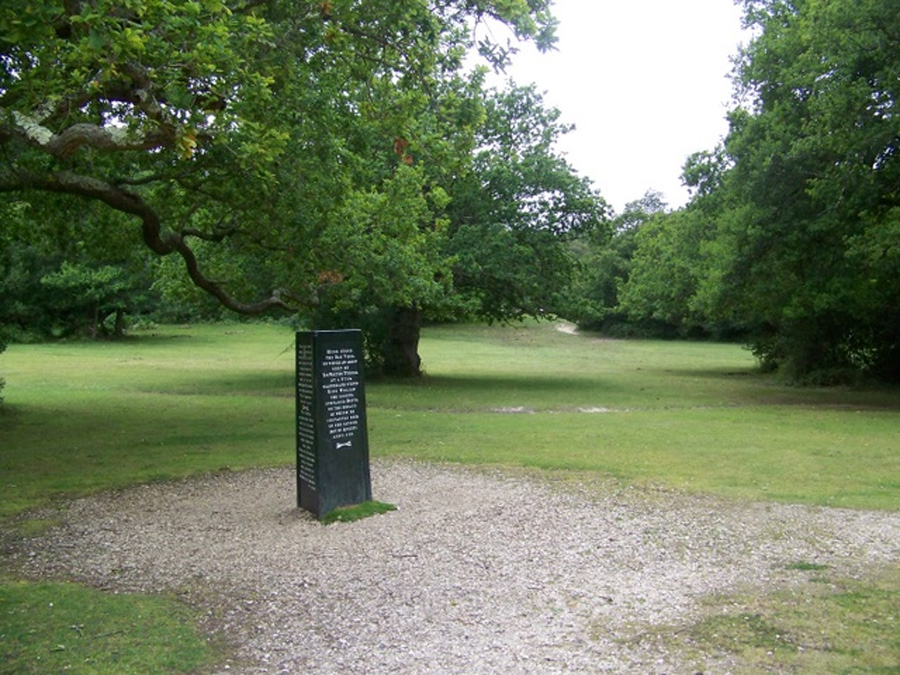On August 2, 1100, William II, King of England, Duke of Normandy overlord of Scotland and Wales, son of William the Conqueror was hunting in England’s New Forest. While out riding with his men, the king was struck by an arrow and died from his wound.
The king certainly had many enemies, both at home and abroad. His father had forcibly conquered the English, defeating the Saxon king Harold Godwinson at the Battle of Hastings in 1066 and ushering in a period of foreign, Norman rule which was to last for generations.
Was the arrow that killed William II launched at him on purpose? Was his death a tragic hunting accident, or was he murdered?
The Rufus
Known as William Rufus for his red hair, the future king was born in Normandy in France some ten years before his father crossed the English Channel and conquered the English. William II was the third son of William the Conqueror, and succeeded his father as king of England upon the Conqueror’s death in 1087.
According to historical accounts, including the account of his death written by William of Malmesbury, the king had a flamboyant personality and was involved in what were referred to at the time as immoral acts. Malmesbury describes him as a person without a moral compass, often overindulging in women and alcohol.

The account also comments on how William II was not a God-fearing man. Because the chronicler was a churchman, the account needs to be filtered to remove the portentous superstitions and supposedly supernatural happenings that predicted the King’s death.
However, it does seem that William’s life was not a pious one and that William was not a popular ruler. Could his lifestyle have made him a target for those wishing for a more religious and upstanding monarch?
The Circumstances of William II’s Death
Lurid details surrounded the death of the king. According to one account, the people of England saw the devil himself in the woods in the year of the King’s death. Moreover, a village spring in Berkshire apparently spurted blood for two weeks.
There were more bad omens that centered around the King too. For example, William II had a nightmare shortly before this death where he bled, and his blood covered the sun, plunging him into darkness. Historians believe that the dream was showing him the manner of his death.
Whatever the meaning of the dream, it certainly frightened the king. Once the dream was over, William refused to sleep in the dark and wanted to be under guard all the time.
Troubled by his ominous dream, the King apparently sought refuge in feasting and drinking with friends. After having his fill of a royal feast, he went out on his ill-fated hunting expedition to the New Forest.
Maybe the King should not have chosen the New Forest area because his elder brother, Richard, had died in the same forest from a hunting accident thirty years ago. It sounds like destiny was toying with William, as he inherited the throne only when Richard died. Years later, he met the fate of his predecessor, and another of his brothers succeeded him, becoming Henry I.
Something of the facts of his death can be pieced together from contemporary accounts. Most concur that the king was killed by the arrow of one of his men. This obviously leads to the belief that his death could have been an assassination.
It is believed that King William was accompanied by his courtier Sir Walter Tirel. William shot at a stag but failed to land a killing blow. After this, Sir Tirel took a shot at the stag from the far side, and his arrow flew wide, striking the king.
- The Duke of Buckingham: Was Dumas’s Hero also James I’s Lover?
- Perkin Warbeck And Lambert Simnel: Pretenders To The Crown
The arrow pierced the King’s lungs, and although it is said that Tirel tried to save the king he fell to his death silently. Once he realized that William was dead, Tirel fled and was oddly not pursued. The other hunting companions, including his brother and successor Henry, instead let him go and, astonishingly, returned from the hunt without even the corpse of their king.
Too Hastily Forgotten
In fact, the events which followed William’s death all suggest an element of foreknowledge. Henry was crowned king at Winchester cathedral only two days after the death of his brother. Furthermore, many historians speculate that it was not Tirel but actually Henry who killed his brother in the forest.

If all the courtiers were on his side, this might have been possibility. The collective fleeing of the courtiers from the forest indicates something more than just shock and despair.
Furthermore, William was unpopular both in England and France. He had suffered several rebellions from the native English during his reign, and also fought a lengthy campaign against his brother in Normandy.
Contemporary accounts of William’s court criticized its decadent and effeminate practices, and there were suspicions that William was himself homosexual. Rarely had an English monarch faced such a union of Church, populace and nobility against him as this unpopular king.
The hunting expedition was a private trip, and in the seclusion of the New Forest there would be no witnesses to what happened. Many find the assassination theory plausible, not least for the speed with which Henry secured the royal treasury and installed himself as king.
But ultimately King William II’s death remains unresolved because one cannot rule out the possibility of it all being an accident. Such accidents with misguided arrows were common in those days.
Even if Henry I took advantage of the situation, there is no clear evidence of his involvement or any foul play in the death of his predecessor. The secret of William II’s death will likely never now be answered.
Top Image: The death of William Rufus. Source: John Cassell / Public Domain.
By Bipin Dimri